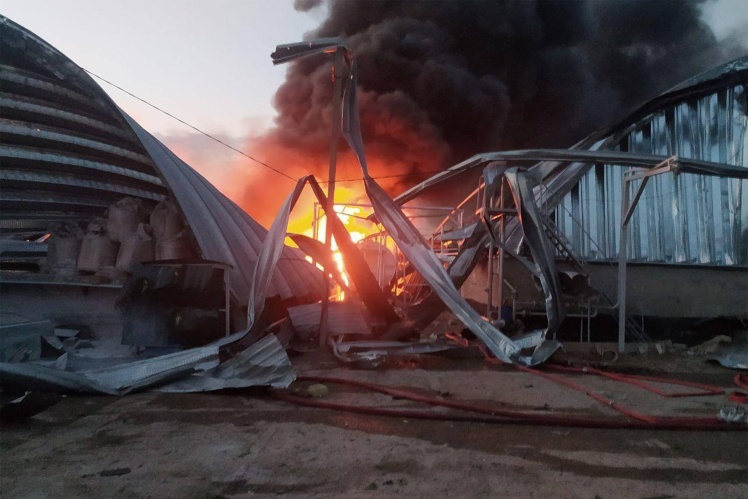How Russia left the "grain deal"
-
Russia says it is ending its participation in the Black Sea Grain Initiative.
-
President Volodymyr Zelenskyy calls on the UN and Turkey to continue the "grain deal" without the participation of Russia.
-
Russia is unilaterally eliminating the humanitarian corridor in the Black Sea through which ships with grain moved.
-
Russia fires missiles at the port in Odesa.
-
Russia declares that from July 20, it will consider all ships bound for Ukrainian ports as carriers of military cargo. This means that the Russians will attack them.
-
Russia launches missile strikes on grain and oil terminals in Odesa.
-
The Ministry of Defense of Ukraine declares that starting from July 21, it will consider all vessels heading through the Black Sea to Russian ports and ports in the occupied territories as carrying military cargo.
-
Russia launches missile strikes on Odesa.
-
The Russian Ministry of Foreign Affairs declares that they will only inspect ships bound for Ukrainian ports.
-
Russia launches missile strikes on Odesa.
What is a "grain deal" and how did it work
Since the beginning of the full-scale invasion, Ukraine has officially closed all its ports on the Black Sea. Mines were laid in the sea area near Odesa port and other ports to prevent a possible landing of Russian troops. On March 12, 2022, near the port of Olvia in Mykolaiv, Russia attacked a Bangladeshi merchant ship with missiles. After that, the International Maritime Organization declared the waters near Ukraine dangerous, and international insurers set exorbitant tariffs for ships planning to go to this zone. As a result, shipping ceased.
Because of this, in July 2022, about 20 million tons of export grain were "stuck" in Ukraine. Minister of Agricultural Policy of Ukraine Taras Vysotskyi explained that in May, Ukraine was able to export only 1.8 million tons of agricultural products by land routes and through river ports. There was not enough capacity and opportunities to export grain, which could lead to famine in some countries. Ukraine is one of the main suppliers of grain in the world, in 2021 it exported about 50 million tons of grain and earned about $12.5 billion. In 2022, this figure was planned to be increased to 70 million tons per year. Due to the blocked export of Ukrainian grain, its prices rose by 23%.
On July 22, through the mediation of Turkey and the UN, Ukraine and Russia signed the "grain deal". According to the agreements, ships with Ukrainian grain went to the international waters of the Black Sea, avoiding mined areas, and then along the agreed maritime humanitarian corridor to Istanbul. Vessels heading to and from Ukrainian ports were inspected by teams that included Russian, Turkish, Ukrainian and UN inspectors.
On August 1, 2022, the first ship left the port of Odesa. As part of the "grain deal", 32.9 million tons of grain were exported (this is approximately 70% of all grain exports of the 2022 marketing year). And world wheat prices have returned to pre-war levels.
Why Russia withdrew from the agreement
Russia threatened to withdraw from the agreement almost as soon as it went into effect. The reason is that the UN additionally promised Russia to help unblock the export of its fertilizers, in particular, ammonia, which Russia exported to the European Union. For this, Russia needs the Tolyatti—Odesa ammonia pipeline, through which approximately 70% of all ammonia exports passed. Ukraine blocked the ammonia pipeline immediately after the major invasion and refused to restore its operation.
Last October, Russia announced that it would withdraw from the "grain deal". The official reason was the naval drone attack on the port of Sevastopol. Later, Russia changed its mind — the agreement was extended for 120 days.
In April 2023, the Ministry of Foreign Affairs of the Russian Federation named five key requirements for the continuation of the "grain deal":
- reconnection of Rossilhospbank to the SWIFT international interbank system;
- resumption of supplies of agricultural machinery, spare parts and service to Russia;
- cancellation of restrictions on insurance and reinsurance of vessels with Russian grain, lifting of the ban on access of such vessels to ports;
- restoration of operation of the ammonia pipeline Tolyatti—Odesa;
- unblocking of foreign assets and accounts of Russian companies related to the production and transportation of food and fertilizers.
In May, Reuters quoted an anonymous source in the Ukrainian government as saying that Ukraine is ready to unblock the ammonia pipeline if the "grain deal" is expanded. That is, ports and goods that can be exported by sea will be added to it.
In July, a few days before the end of the term of the "grain deal", UN Secretary General Antonio Guterres offered Russia not to withdraw from the "grain deal" in exchange for the connection of Rosselkhozbank to SWIFT. Nevertheless, Russia has stated that it will not extend the agreement.
What will happen to Ukrainian grain now?
According to Denys Marchuk, Deputy Chairman of the All-Ukrainian Agrarian Council, Ukraine is now in a better position than a year ago. First of all, now there are about 9 million tons of grain left from the last harvest — in contrast to 20 million tons in 2022. But Ukraine still needs to find alternative ways to export this grain.
President Volodymyr Zelenskyy insists on the continuation of the "grain deal", but without the participation of Russia. He spoke about this with the President of Turkey, Recep Erdogan. As POLITICO writes, they may have discussed that the Turkish fleet could accompany ships with grain and protect them from possible Russian attacks. However, Ukraineʼs ambassador to Turkey, Vasyl Bondar, considers this assumption to be fantastic: "The Turks will never engage in an open confrontation with Russia, so [the idea that] the Turkish fleet will accompany the ships is nonsense."
The Ministry of Infrastructure of Ukraine has developed an alternative route instead of the already closed humanitarian corridor. It leads from the ports of "Great Odesa" to the Sulin estuary in the territorial waters and maritime economic zone of Romania. This route, as Andrii Klymenko, head of the Institute of Strategic Black Sea Studies, tells Babel, is much closer to the coast than the previous corridor. "In my opinion, this was done so that the ships could be covered by Ukrainian coastal artillery," he explains.
Such a route could theoretically work if Romania agrees. But there are several nuances, adds Klymenko. The first is the depth: it must be sufficient for the passage of ships. The second is Russian mines. "They [the Russians] could secretly mine the approaches to Odesa ports again," says Klymenko. “To ensure mine safety, we need minesweepers, which we do not have. So it can be Romanian or Turkish minesweepers if they agree."
POLITICO names another possible option — to export Ukrainian grain through the Romanian port of Constanta, which is closest to Ukraine. But this is hardly possible, because the port in Constanta can process a maximum of 25 million tons of grain per year, and only under the condition of perfect logistics and weather.
Without the Black Sea, Ukraine does not have many export options — it is road transport or railway. But the possibilities of such export are limited — "Ukrzaliznytsia" can transport about one million tons of grain per month, and motor vehicles about 800,000 tons, says the deputy head of the All-Ukrainian Agrarian Council, Denys Marchuk. In comparison, up to 4 million tons per month could be transported by sea. In addition, logistics are complicated by the difference in railway track width in Ukraine and Europe.
“We could transport the grain to the port in Klaipeda, but it can only be delivered there through Poland,” says Denys Marchuk. “The track is wide in Ukraine, narrow in Poland, wide again in Latvia. This creates additional financial burdens for Ukrainian producers. That is, to export grain this way at some point simply becomes unprofitable.”
Another problem is the position of some EU countries. Last year, part of the Ukrainian grain that was transported by land remained in Romania, Poland, Bulgaria, Hungary, Slovakia — it was bought at lower prices by local traders and then resold. Because of this, local farmers could not sell their own grain. The countries said they lost about €400 million. In Poland, farmers went on strike against the import of Ukrainian grain and even blocked roads.
In April, first Poland, and then other countries closed their borders for the import of Ukrainian agricultural products. In May, a compromise was found — the borders were opened, but only for the transit of Ukrainian grain to European ports. Imports remained banned, and the European Commission agreed to provide these countries with an additional €100 million to cover the losses.
The restrictions will expire on September 15. Poland and Hungary demand to extend it, otherwise they will again close the borders to Ukrainian grain shipments. This will be a problem for Ukraine.
“Many transit routes go through Poland,” says Denys Marchuk. “If Poland insists on extending the ban on importing [Ukrainian grain], it will significantly worsen our relations and lead to mirror measures on our part. For example, Ukraine will introduce restrictions on the import of certain Polish goods. All this will play into the hands of Russia.”
This year, Ukraine plans to export about 40-44 million tons of grain — at the level of last year, says Marchuk. It is practically impossible to do this without the Black Sea routes. “By shelling Odesa ports and grain terminals, Russia is demonstrating to international trade that it is dangerous here. And that foreign ships can also be fired upon,” the expert says.
A fire at one of the granaries after the Russian shelling of Odesa, July 21, 2022
Getty Images / «Babel'»
Perhaps Turkish President Recep Erdogan will be able to turn the situation around. He has already announced that he will discuss the continuation of the “grain agreement” with Putin. “Erdogan is now claiming to be the leader of the Islamic world,” says Andriy Klymenko. “And everyone is interested in restoring the export of Ukrainian grain. After all, prices can rise again, and this threatens poor African countries with hunger, which will not be able to buy grain.”
Translated from Ukrainian by Anton Semyzhenko.
Russia always lies, and Babel never gets tired of catching it in lies. Support us in this: 🔸 in hryvnia, 🔸 in cryptocurrency, 🔸 Patreon, 🔸 PayPal: [email protected]


